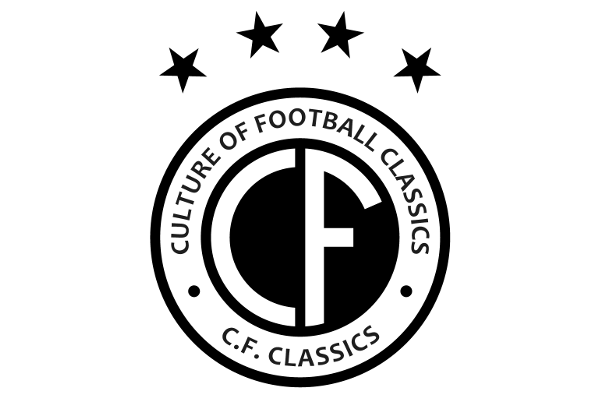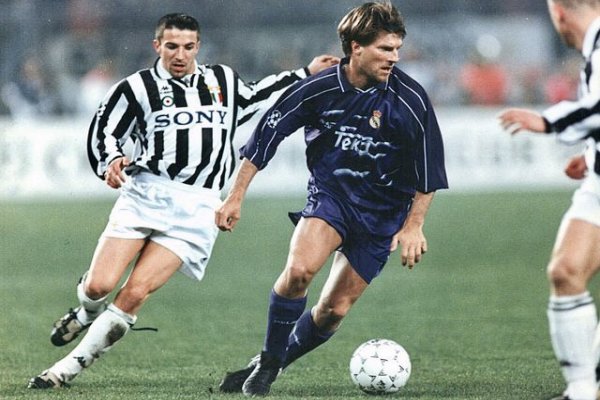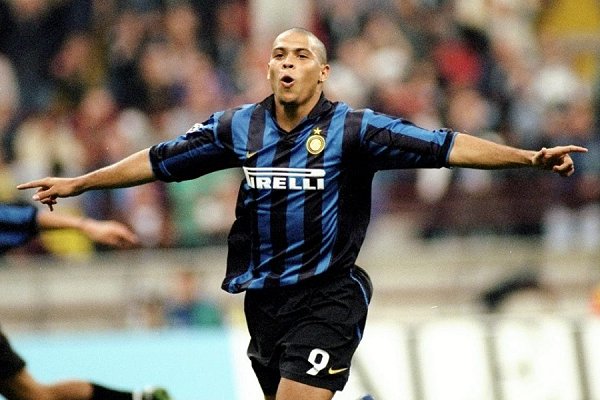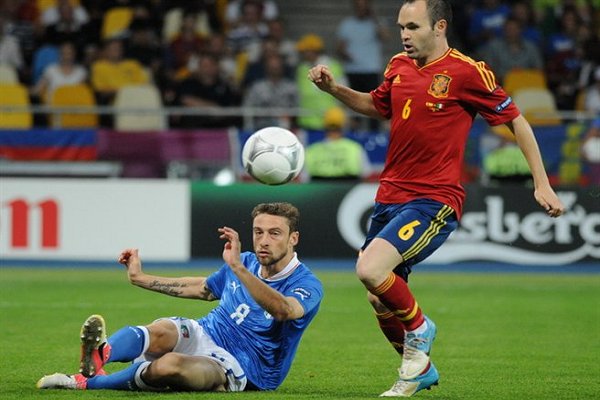The Greatest Footballers of the 1980s
No.1 Zico
No.2 Falcão
No.3 Júnior
No.4 Michael Laudrup
No.5 Liam Brady
No.6 Éder
No.7 Chris Waddle
No.8 Enzo Scifo
Enzo Scifo was a midfield playmaker who seemingly had a bit of everything to his attacking game. He was equally adept at playing in an advanced attacking midfield role, on the right, or further back as a deep-lying playmaker, dictating the tempo of his team's play. It goes without saying that his passing was one of his strongest assets, be it his short game, linking up play and stitching moves together, or his precision on his cross-field balls or deeper passes to start quick counter-attacking moves. Scifo was fantastic carrying the ball too, his dribbling and darting runs proving a constant menace for the opposition. And to top it all, Scifo knew where the back of the net was. He may not have scored as many free-kicks as others in this list, but he was deadly in open-play from around the edge of the box, his trademark goals were often low drilled shots arrowing low into the corner of the net.
No.9 Roger Milla
Something of an icon of the World Cup in the 1990s, Roger Milla may not have played at the very highest level of domestic football in Europe, but he certainly came to the fore when he donned the shirts of the Indomitable Lions at football's biggest event. His iconic goal celebrations at Italia'90 became one of the tournament's most memorable moments, whilst four years later at USA'94 he smashed his own record as he became the oldest goalscorer at a World Cup tournament when he scored against Russia as a 42 year-old.
No.10 Glenn Hoddle
Whilst the 1970s had seen a plethora of maverick talent gracing the English league, the 1980s was the opposite, which is why the elegant style of Glenn Hoddle made him stand out like a sore thumb. We often wax-lyrical about how left-footed footballers seem to hit the ball more sweetly than their right-footed counterparts, yet here was a right-footed player whose touch almost made him look like he was caressing the ball. A number of spectacularly beautiful goals and a reputation for lazer-guided passes and deft touches propelled him to the forefront of English football and a growing clamour ensued for him to be a regular member of the national team. However, as has often been the case with creative English footballers, national team managers Ron Greenwood and Bobby Robson both struggled to get the best out of him in their systems. One manager who did though, was Arsène Wenger. Having just been installed as the new manager of Monaco, Wenger made Hoddle one of his first signings, taking the 30 year-old to the south of France on a free transfer. It would prove to be an absolute masterstroke by Wenger for both Monaco and Hoddle. As the creative fulcrum of the team, Hoddle was a revelation in France, playing with the sort of freedom that many England fans over the years had been screaming out for. His assists and eight Ligue 1 goals saw him named as the Foreign Player of the Year as he inspired his new team to the Ligie 1 title. The stylish performances and assists kept coming in his second season in France but now he added more goals to his game too. Playing in a more advanced creative role he scored an incredible 18 Ligue 1 goals in just 32 matches, finishing as the league's second highest scorer, with only Marseille's Jean-Pierre Papin ahead of him. Sadly, having set the league alight for two years with his creativity and goals, Hoddle's time at the club came to an abrupt end as a serious knee injury meant that he only played three more games for the club. Hoddle left France with not only a Ligue 1 winners medal, but also with the knowledge that he'd helped change the perception of English footballers in France. So, after the success of an ageing Hoodle, it was then no real surprise that Marseille were so keen to sign one of his former team-mates, Chris Waddle, and that the winger would also have such a successful time in the south of France.
No.11 Hans Krankl
No.12 Gheorghe Hagi
No.13 Enzo Francescoli
No.14 Dragan Stojkovic
No.15 Michel Platini
No.16 Jean-Pierre Papin
No.17 Manuel Amoros
Amoros was a superb full-back, one of the best in the world in the 1980s. When it came to defending he was extremely competitive and tenacious, whilst his technical ability meant that he carried a real threat going forward, with his surging runs, overlaps and combination play proving a constant menace for the opposition but a real attacking bonus for his own team-mates.
Despite being known primarily as a right-back, Amoros was also extremely comfortable playing with his left foot, so he was equally adept at playing left-back, a position he filled in at a number of times for both club and country.
No.18 Bernd Schuster
Schuster was a great passer of the ball, and played as both an attacking midfielder and a deep-lying playmaker, indeed he would also sometimes play even deeper, as a libero, his trademark passes starting off move after move. Schuster was a free-kick specialist and scored plenty of great goals, plenty of long range ones as you'd expect but some great subtle ones too. As well as his expertise with the dead-ball he was fantastic running with the ball too, surging forward dangerously time after time, especially during his time at the Camp Nou. In the swan song of his career he got first, second and third goals of season in West Germany!
Unfortunately, like so many really talented footballers there seemed to be something inbuilt in to his character to have trouble follow him wherever he went, and Schuster's time at most of his clubs would eventually result in a fallout and a transfer.
No.19 Manni Kaltz
One of our favourite players of the late 1970s and early 1980s, Kaltz was a cracking attacking right-back, a memorable sight bombing up and down the flank with his socks rolled down. He was renowned for his fantastic crossing, hit with so much spin and curve that they were given their own name, "Bananenflanken" ("banana crosses"). He formed an unlikely partnership with Horst Hrubesch, summed up perfectly by a quote from the giant centre-forward; "Manni banana. I head. Goal!"!
A legend at Hamburger SV, Kaltz has made the second most appearances in the Bundesliga with 581, only Eintracht Frankfurt's Charly Körbel is ahead of him. Kaltz was also known as a penalty specialist, with 53 of his 76 goals coming from the penalty spot.
No.20 Andreas Brehme
Brilliant attacking full-back or wing-back, Andy Brehme was of the world's greatest left backs in the second half of the 1980s and early 1990s. He is one of the few players who was completely two-footed, with teammates , coaches and commentators regularly stating that they didn't know which was his stronger foot. This meant that whilst he mainly played on the left flank he could also play on the right as well. Brehme said that he thought his right foot was more accurate but his left foot more powerful. Brehme was renowned for his fantastic delivery from his crosses, and his accuracy and power with the ball at his feet also meant he was a set-piece expert. He scored some great goals from free-kicks but his penalty taking was even more extraordinary, goalkeepers not knowing whether he would line up to take them right footed or left footed.
No.21 Lakhdar Belloumi
A wonderfully gifted attacking midfielder, Lakhdar Belloumi is widely regarded as the greatest Algerian footballer of all-time, and one of the greatest African players of all-time.
Belloumi's probably not as well known as many other great players of his era because Algeria had a law at the time that forbade any player from leaving the country before the age of 27. So, despite interest in 1981 from a number of huge European clubs, including Barcelona, Belloumi had to reman in his homeland, playing for GCR Mascara. Whilst that ruling meant that we missed out on seeing him grace European football competitions, we were lucky enough to see him at Espana'82, immediately wondering who on earth this player was, and why we'd never heard of him before. Forming a fine attacking trident along with Salah Assad and Rabah Madjer they would have gone through the group stages if it wasn't for the events at the last match between West Germany and Austria, which became known as the Disgrace of Gijón.
No.22 Rabah Madjer
One of Algeria's greatest ever players, Rabah Madjer made his name in the mid 1980s with Racing Club Paris before transferring to Porto in 1985. The striker would enjoy a successful six year spell with the Portuguese club, scoring one of the greatest goals in a European Cup final, with his famous back-heeled finish in the 1987 final against Bayern Munich. The goal was so iconic that it would have its own name as a signature skill in France, with the term "La Madjer" being used to describe a back-heeled goal.
Tweet



